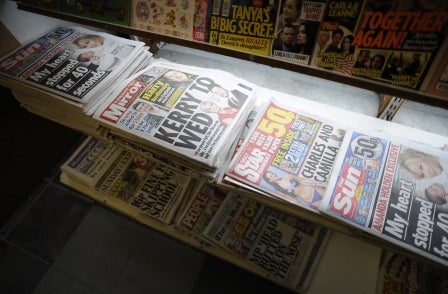
All the national newspapers which commented on the Royal Charter press regulation plans today signalled at least qualified support, with the exception of The Guardian.
While The Guardian is strongly against the move, the Independent expressed tentative approval whilst The Times and Daily Mail all backed the initiative. The FT praised the move, but said it would prefer to see a genuinely independent press regulator.
The Guardian was deeply critical. Its leader described the Royal Charter proposals as “Beaverbrook to Blackadder in one bound” and said it would take “some suspension of disbelief to take seriously the notion that Conservative ministers are now proposing that this device be used to regulate the British press.”
The paper highlighted the fact that government websites say a chartered body "surrenders significant aspects of the control of its internal affairs to the Privy Council" and said: "Anyone opposed to statutory underpinning of press regulation ought in theory to break out in sweat at the thought of ministers of the day – not even parliament — meddling in how the press is run."
The paper also warned that the proposed Recognition Panel which would oversee the new regulator would not be independent enough.
"From the politicians and victims of press misbehaviour there is suspicion about backroom deals – and a strong feeling that it is not independent enough. The independence question is crucial. Who gets to appoint the members of the new regulator? How can you guarantee it doesn't become captured by the industry, as effectively happened with the PCC? Who will verify that it is Leveson-compliant from the start and on an ongoing basis?"
The FT said:
"The Royal Charter is an ingenious concept…But it cannot eliminate the risk of creeping state interference. While some may see such a fudge as a better expedient than statutory control, this newspaper continues to favour credible independent regulation at arm's length from the state."
The Times, on the other hand, was in favour of the Charter, and stressed the danger of the alternatives to the Conservative Party plans. Its leader argued the press would be wise to accept the proposals, lest they be replaced by “something worse” – such as a statutory body, as recommended by Leveson.
Whilst the Guardian said the Royal Charter meant regulation would be subject to Parliament's will, The Times broadly agreed with the Prime Minister's belief that statutory regulation “would create a vehicle for politicians… to impose regulation and obligations on the press.” The paper said:
"In proposing press regulation by this route, David Cameron has shown that he understands the profound fear felt by the press — a fear that should be shared by every freedom-loving person — of a media becoming subject to political or judicial pressures. Compulsory regulation of any sort is unattractive."
The Times did, however, express some concerns:
"The Conservatives are also proposing that there should be exemplary damages for publishers who do not participate in self-regulation. Such damages are unjust and against European law."
But the paper said that the Royal Charter libel arbitration scheme was preferable to the Leveson plan:
"First, it suggests that a future arbitration process should be 'inexpensive' for complainants rather than 'free', which should minimise vexatious complaints. Second, it abandons Leveson’s view that a process not joined by 'all significant news publishers' would be a failure. The latter modification allows parties to enter a system of regulation without raising the spectre of compulsory legislation coming into force if a few refuse to sign up. This also addresses Leveson’s failure to specify exactly what, in an increasingly online age, a 'significant news publisher' actually is."
The Independent was largely in favour, and described a Royal Charter as “the least worst option”. The paper said the proposals were “grounded in common sense," and that Cameron's plans are a "serious, commendable attempt to find a middle way between those calling for statutory regulation – which this newspaper, like almost every other, considers a threat to the freedom of the press – and those who would argue for no change at all."
The paper also express concerns about the threat of exemplary damages:
"There are questions as to whether the threat of exemplary damages to hang over uncooperative publications is too harsh, possibly even in contravention of EU law. There are also concerns about the proposed arrangements for appointments to the Recognition Panel and the exclusion of serving editors. The arguments will roll on, but at least this is a promising start."
The Daily Mail’s leader today was broadly in favour of the plan – again describing the Royal Charter as “the least bad option”. The paper said:
"David Cameron deserves much credit for coming up with a way to impose rigorous, independent self-regulation – the toughest, indeed, since Oliver Cromwell’s day – while avoiding the sledgehammer blow to freedom implicit in statutory control."
On the downside, the Mail said:
"Not only is it fiendishly complicated, but it would place in the hands of a small body of quangocrats, with little or no experience of newspapers, a worrying degree of control over the public’s right to know."
But despite its concerns, the paper said the plans were ultimately a triumph: "in defying Lord Justice Leveson and his dreadful celebrity supporters in the Hacked Off campaign (step forward Hugh Grant, Max Mosley and Steve Coogan), the PM has put forward the least bad option so far, showing political courage that commands respect.
Email pged@pressgazette.co.uk to point out mistakes, provide story tips or send in a letter for publication on our "Letters Page" blog
